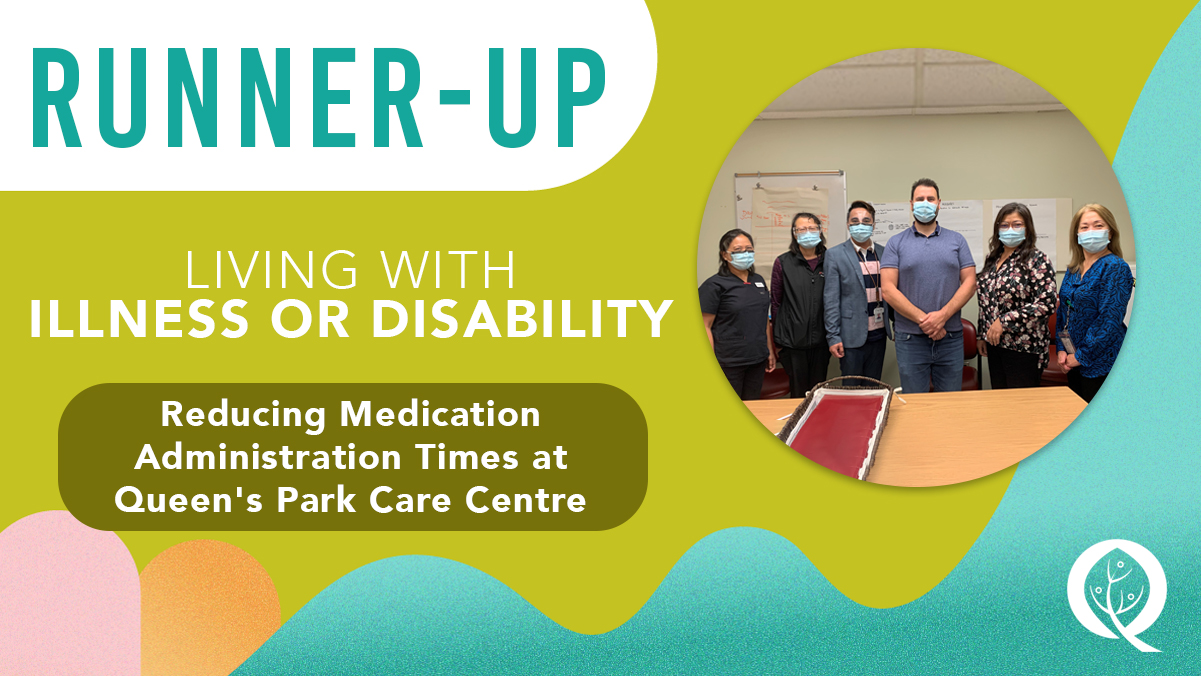- 2023
|
- Runner-Up
|
- Living with Illness or Disability
There’s a saying that every minute that passes by is one more chance to change something that could change everything.
Nurses at Queen’s Park Care Centre (QPCC) in New Westminster must have been thinking that when they suggested that changing the process around administering medication to people in their long-term care home would save time. And when that time was added up, it could make a difference in the quality of life for those in care.
“Older residents in long-term care homes are often prescribed multiple medications to treat multiple medical conditions; consequently, nursing staff spend a significant amount of working hours administering medications, taking away from the time available for direct resident care and
assessments,” says Dr. Nick Petropolis, QPCC’s medical director, who was part of the team that led this change.
Dr. Petropolis says the time crunch was beginning to impact staff collaboration, as care aides were dissatisfied that their nursing colleagues weren’t as available to help them with resident care. As a result, a multidisciplinary team of physicians, nurses, care aides, pharmacists, clinical nurse educators and quality improvement nurses decided to tackle the problem together. Their goal: To reduce the time it takes to administer morning medications by just three minutes per resident by Oct. 31, 2021.
“This was the best thing we ever did at QPCC,” says Dr. Petropolis, noting feedback from his team. “When we started this initiative in May 2021, the nurses were taking nine minutes per resident, which spiked to 16 minutes in July. Through continuous polypharmacy huddles and ‘in the moment’ medication reviews by care providers, the administration time was reduced to five minutes by Oct. 12, 2021.”
The team approached the quality improvement project by evaluating process, culture, education and communication.
They used huddles to their advantage, weaving medication conversations into daily practice. They targeted medicines that take the longest to administer, such as inhalers, eye drops, creams and injections. Nurses were empowered to advocate for medication change requests based on criteria such as patient refusal, patient need, side effects and effectiveness – for example, replacing a pill with a patch. Physicians bought in, with an audit showing that on medication review physicians accepted 88% of the suggestions nurses made – which played a key role in reducing the administration time per resident.
“Initially, I thought all the medications I give are necessary. I learned that as a team member, I can give feedback or ask the doctors based on my assessment to change, discontinue or decrease the dosage of the medication,” says Angeline Bromfield, a licensed practical nurse. “I feel valued by my colleagues, especially the doctors. As a nurse, I now have more time to interact with my residents. They are, in turn, more compliant with their medications, pleasant, and happy residents. Polypharmacy is not just about reducing medications but also, for residents to have a quality of life that they are entitled to have.”
Adds Lira Astronomo, a clinical nurse educator: “This project enhanced the regular, every-six-months, pharmacist-led medication review. This is like a mini-med review of every six weeks, led by the nurses. And that is EMPOWERING. Now, at the sustainment phase, nurses will increase their confidence over time by incorporating this mini-med review into their routine.
“The nurses saved time which can be used to provide safe, quality care, which means a person-focused rather than task-focused approach. I’m truly proud to be a part of this team,” says Estelle Roberts, a resident care coordinator.
One big learning was that this kind of culture change needs to be an ongoing activity, such as regular huddles, with education and shared commitment between care providers. The team has now started expanding the quality initiative by coaching staff at other long-term care facilities across the Fraser Health region.


